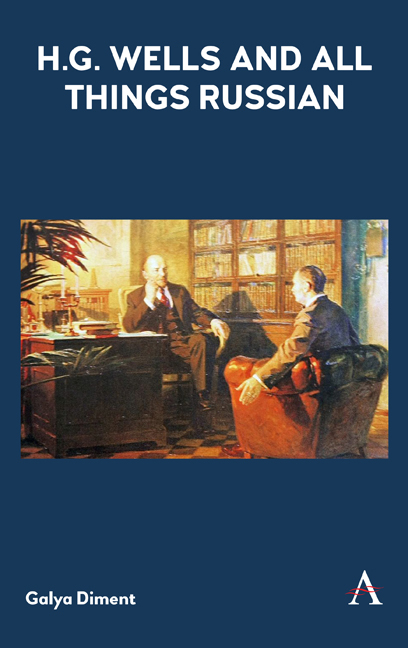Book contents
- Frontmatter
- Dedication
- Contents
- List of Illustrations
- Acknowledgments
- List of Contributors
- A Note on Transliteration
- Introduction: “The Wells Effect”
- Part One WELLS IN RUSSIA: PRE-WORLD WAR II
- Part Two WELLS IN RUSSIA: POST-WORLD WAR II
- Part Three RUSSIA IN WELLS
- APPENDIX TRANSLATIONS
- Appendix 1 V. D. Nabokov on Visiting H. G. Wells in England in 1916 (From Iz voiuiushchei Anglii, 41–51)
- Appendix 2 Alexander Amfiteatrov on Wells's 1920 Visit to Russia
- Appendix 3 Alexander Belyaev on the Wells-Lenin Debate about “Utopias”
- Appendix 4 Karl Radek and Solomon Lozovsky to Stalin
- Appendix 5 Yury Olesha on His Love for H. G. Wells (In Literaturnyi Kritik 12 (1935), 156–7)
- Appendix 6 Yuly Kagarlitsky on Being a Soviet Biographer of Wells
- Bibliography
- Wells, Herbert George – Works Index
- General Index
Appendix 3 - Alexander Belyaev on the Wells-Lenin Debate about “Utopias”
from APPENDIX TRANSLATIONS
Published online by Cambridge University Press: 06 September 2019
- Frontmatter
- Dedication
- Contents
- List of Illustrations
- Acknowledgments
- List of Contributors
- A Note on Transliteration
- Introduction: “The Wells Effect”
- Part One WELLS IN RUSSIA: PRE-WORLD WAR II
- Part Two WELLS IN RUSSIA: POST-WORLD WAR II
- Part Three RUSSIA IN WELLS
- APPENDIX TRANSLATIONS
- Appendix 1 V. D. Nabokov on Visiting H. G. Wells in England in 1916 (From Iz voiuiushchei Anglii, 41–51)
- Appendix 2 Alexander Amfiteatrov on Wells's 1920 Visit to Russia
- Appendix 3 Alexander Belyaev on the Wells-Lenin Debate about “Utopias”
- Appendix 4 Karl Radek and Solomon Lozovsky to Stalin
- Appendix 5 Yury Olesha on His Love for H. G. Wells (In Literaturnyi Kritik 12 (1935), 156–7)
- Appendix 6 Yuly Kagarlitsky on Being a Soviet Biographer of Wells
- Bibliography
- Wells, Herbert George – Works Index
- General Index
Summary
Alexander Belyaev (1884– 1942) wrote this article a year before Wells returned to the Soviet Union. This article, with its sharply drawn juxtaposition between Wells and the French pro-Stalinist Communist writer Henri Barbusse (1873– 1935), appears to have been his attempt to make the censors more sympathetic in publishing it, since as I am arguing in my introduction, he may have had a definite purpose of indeed urging Wells to come back. In late December of 1941, the DneproGES Dam was blown up at Stalin's command when the German Army was approaching its territory and many thousands of unaware Soviet citizens perished in floods as a consequence. Belyaev died of hunger and cold around the same time, not having been able, due to his illness, to evacuate when the Germans occupied a Leningrad suburb, where the family lived, 24 km from the city.
The Lights of Socialism, or Mr. Wells in the Shadows
(“Ogni sotsializma, ili gospodin Uells vo mgle.” This is of course a play on Wells's title, Russia in the Shadows, and its Russian translation, Rossiia vo mgle.)
On the shores of the Visla and the Dnieper, the Don and the Chusovaia the blood spilled in the Civil War was still fresh. The exhausted country was healing its wounds. Cities were taking stock of their factories, plants, storage facilities, and apartments. Local newspapers printed in their local sections: “During the first half of November, 15 factories/ plants and 250 storage facilities and apartments have been uncovered.” Petrograd was freezing. People did not have firewood or coal; their pipes were bursting. The Chrezuptop (The Extraordinary Office in Charge of Heating Materials) was sending urgent orders. Trains were full of qualified workers returning from the front lines and villages to tend to empty factories and frozen industrial kilns, in order to breathe in new life into them. Petrograd looked like a severely wounded war invalid.
One dark autumn evening a solidly built man with a top hat on, his mustache trimmed short, was carefully making his way through the motley dressed crowd on Nevsky Prospect. When a weak light of a gas lamp in a nearby window fell on him, passerby would stop in amazement to study this specter from the past: he was dressed in an excellent demi-season coat of foreign cut; his hands were in suede gloves; his feet in elegant boots.
- Type
- Chapter
- Information
- H. G. Wells and All Things Russian , pp. 191 - 196Publisher: Anthem PressPrint publication year: 2019

